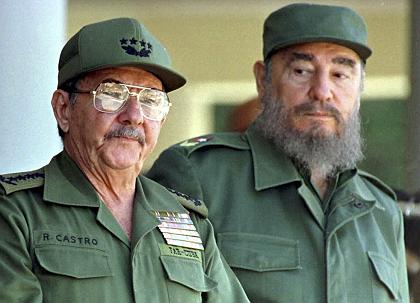
Brothers Raúl and Fidel Castro
March 4, 2009
Raúl Casto recently reshuffled Cuba’s government, replacing or moving twelve cabinet members a year after assuming the presidency from his brother Fidel. Supposedly, Fidel approved the reshuffle. It would seem that Raúl is now the undisputed Cuban leader, although the shadow of Fidel will linger over Cuba long after his demise. Who will succeed the 77-year old Raúl? And will the U.S. keep its hands off?
The 82-year old Fidel is reportedly in very poor health. He hasn’t written a newspaper column since December 15 and he failed to appear live or on television on January 1st to mark Cuba’s 50 years of communism.
I have mixed feelings about Fidel’s legacy. Many Cubans would probably agree, albeit covertly, that Fidel was a welcome guest for dinner, but overstayed his welcome. The revolutionary became a dictator for life. It might have been different. In April 1959, shortly after taking power, Fidel traveled to the U.S. The Eisenhower administration could have embraced Fidel, offering him economic assistance. But remember this was during the Cold War and Castro smacked of socialism/communism. Eisenhower snubbed him. He met instead with then Vice President Nixon for a few hours. No economic assistance was offered. The next year Castro turned to Russia for economic assistance and the rest is history.
Under Raúl’s leadership, we may see a more pragmatic, less doctrinaire Cuba. With new Cuban leadership and with a Barack Obama presidency, perhaps it is time to take a fresh look at the 46-year old economic, trade, and financial sanctions the U.S. imposed on Cuba following the failed Bay of Pigs invasion of Cuba by US-backed Cuban exiles. The rest of the world wants the embargo ended as seen by the October 2008, UN General Assembly overwhelming vote – for the 17th year in a row – in favor of lifting the U.S. trade embargo on Cuba. Some 185 of the assembly’s 192 members approved a resolution, which reiterated a “call upon all states to refrain from promulgating and applying laws and measures (such as those in the U.S. embargo) in conformity with their obligations under the Charter of the United Nations and international law.” The U.S., Israel and Palau voted against the resolution, while Micronesia and the Marshall Islands abstained.
A good start would be passage of the “Freedom to Travel to Cuba Act,” which passed the House and is now pending in the Senate. The Act would would lift all restrictions on U.S. citizens traveling to the island. The bill states: “The President may not regulate or prohibit, directly or indirectly, travel to or from Cuba by United States citizens or legal residents, or any of the transactions incident to such travel.” It also states that restrictions and regulations on Cuba travel now in effect would end with the law’s enactment. Observers say President Obama, who has promised Cuban-Americans freedom to travel and send money to Cuba, is unlikely to veto a bill eliminating travel restrictions.
My wife and I traveled “legally” to Cuba in November 2003 on one of the last so-called “People-to-People” tours, visiting Havana, Viñales, and Santiago de Cuba. Shortly thereafter, the U.S. Treasury Department stopped issuing “people-to people” licenses. As the remaining licenses expired – most in November or December 2003 – so did those trips. Hopefully, once the “Freedom to Travel to Cuba Act” is enacted, my wife and I will again be able to visit Cuba legally.
Finally, Obama signed executive orders directing the CIA to shut down the Guantánamo Bay detention camp within a year. After Guantánamo is closed, why not give Guantánamo Bay back to Cuba, its rightful owners. Why should we continue to have a base in Cuba? The U.S. occupation of Guantánamo dates back to the passage of the Platt amendment to a U.S. Army Appropriations Bill of 1901, which gave the U.S. the right to intervene militarily in Cuban affairs whenever the U.S. decided such intervention was warranted. Cubans were given the choice of accepting the Platt Amendment or remaining under U.S. military occupation indefinitely. The U.S. has intervened militarily in Cuban affairs at least three times. U.S. intervention endowed Cuba with a series of weak, corrupt, dependent governments until the triumph of the Cuban revolution in 1959. In 1903, the U.S. used it to obtain a perpetual lease of Guantánamo Bay, a blatant example of U.S. gunboat diplomacy. The current Cuban government, as do I, consider the U.S. presence in Guantánamo to be illegal, and the Cuban-American Treaty to have been procured by the threat of force in violation of international law.


 The Hunger Site
The Hunger Site
March 4, 2009 at 8:24 pm
“Communism is the death of the soul. It is the organization of total conformity – in short, of tyranny – and it is committed to making tyranny universal.”
— Adlai E. Stevenson